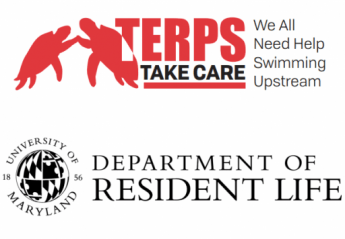Ever wonder who is behind the wheel at Terps Take Care – the blog, the newsletters, the resource cards, and more? Why, it’s your friendly neighborhood case managers! Stationed on North & South Campus, we are here to support all residential Terps in a variety of ways. Read on to find out more!
Dana: So, we’ve published a lot of interviews here on the Terps Take Care blog and through the newsletters, but I guess this is the first time we’re sort of…interviewing ourselves. I guess I can start by introducing us! My name is Dana Calandrino, and I’m the case manager for the South Campus Residence Halls, including Leonardtown and South Campus Commons. And my partner-in-crime and co-case-manager, for the North Campus & Heritage Communities, is Kimberlee Small. Kim, do you want to maybe get us started by sharing how we support the overall health and wellness of the Terps who live on campus?
Kim: Typically I am helping students get back on track after a mental health crisis. I work as a liaison with other campus entities including but not limited to Academic Affairs, the Registrar’s Office, Financial Aid, Counseling Center, Behavioral Health and Dean of Students Office. I assist students with creating wellness plans. And sometimes there are students who just need to vent about what they are going through. I’m happy to be that supportive ear.
Dana: I think that summarizes a lot of what we do here – maybe I can talk about some of the particulars, and the historical context. So, this position was created in 2016, and the idea is that we, as case managers, can provide sort of…wrap-around support for students who are really struggling. Like Kim mentioned, we help coordinate support with faculty and various campus resources, as well as students and their personal support systems – parents and family. We also try to provide some intentional follow-up, based on individual student need, so that no-one is left behind after one conversation or meeting. That means working with students to develop those plans of critical care, as well as providing other strategies and tools. I’ve worked with students to develop plans for time-management, anger and anxiety management, and for navigating dense administrative paperwork with other departments. And also like Kim said, more than anything, we want to be there to help students understand that their experiences are valid, and that they don’t need to handle those situations alone.
So I guess the next question is….what’s something you’d like to remind students of, Kim?
Kim: Seeking out help is a sign of strength and courage not weakness.
Dana: Yes, absolutely. And I suppose I’d also say… as people, we all tend to minimize our struggles, or think that we should be “doing better” on our own. But humans aren’t meant to manage everything in isolation – we’re communal. And in most cases, our struggles are a reasonable reaction to the situation we find ourselves in. And so, similar to Kim’s message, I would say: please, try to be gentle with yourself.
Kim: As we are imperfect beings, mistakes are inevitable. What matters more is how you recover from the mistakes. Be patient with yourself.
Dana: …Everything you say is perfect [laughter].
Okay, so. I love this next question – it shows up in almost all of our interviews and everyone has really good advice. I hope we can do it justice [laughter]. So…we are out here trying to help students find balance and mental wellness in their lives, knowing of course that this is something everyone struggles with from time to time! Now – how do we, personally, try to keep things balanced for ourselves and maintain our own wellness?
Kim: I do things such as get lost in a good story (via books, movies, and tv shows), take time away from the office by vacationing with friends, listen to music and step away from my desk to take a short walk when I feel overwhelmed.
Dana: This is why Kim and I get along so well! I don’t know if we have many conversations without checking in on the newest movie or show we’ve been watching [laughter]. So for me – I really try to maintain strong work/life boundaries, which I think Kim does as well. I think it’s really important to carve time out of your day to just do something you purely enjoy, and to honor it: an appointment with yourself, one you can’t cancel. I know it’s hard when the world is pulling you in a hundred directions, but it’s such a vital part of wellness. For me, that used to look like hiking a lot, but I’ve developed some mobility issues. So, now I try to find other ways to connect with nature. I also take a few fitness classes at an off-campus studio, and I like to create art as well. Watercolors are my current preferred medium, but my goal is to teach myself to crochet this year as well. As much as I love the internet, I also love that these things force me to stop doomscrolling, and create a small space of just…internal quietude, for a few moments.
All right. Last question! Where can we be reached, Kim?
Kim: I can be found on campus in Johnson-Whittle, Office 1137. You can contact me via email at smallkm@umd.edu, or by phone at 301-226-4835!
Dana: And I’m over in Calvert, Office 0220. The best way to reach me is by email at dcalandr@umd.edu, or you can connect with me by phone or text [business hours only] at 301-314-1313. Please, reach out to us any time! We are so looking forward to connecting with you.
